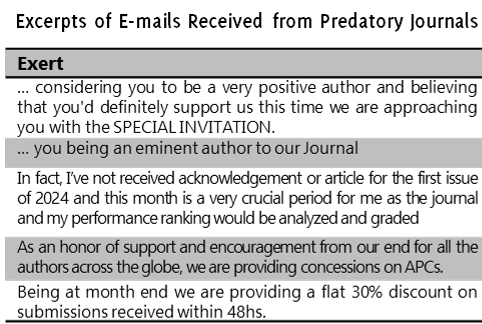Predatory Publishing: A Medical Student Author’s Perspective
DOI:
https://doi.org/10.5195/ijms.2024.2554Keywords:
Predatory journals, Experience, Medical student, Predatory Publishing, Open Access Model, Article Processing Charges, Scholarly Deception, Ethical Academic Practices, Delphi Consensus, Research Awareness, Illegitimate JournalsAbstract
Predatory publishers are, generally, dishonest, lack transparency and center in publishing counterfeit journals to exploit the open-access model in which the author pays, and through this, obtain their self-interest profits. Unfortunately, these types of journals are on the rise and may easily deceive inexperienced researchers such as medical students who aspire to venture into research. In this context, the purpose of the present work is to offer a generalized view of 'predatory' magazines, how to identify them and avoid them; as well as raise awareness about its existence and discern its deceptive emails through my personal experience.
References
Alamri Y, Al-Busaidi IS, Bintalib MG, Abu-Zaid A. Understanding of medical students about predatory journals: A comparative study from KSA and New Zealand. J Taibah Univ Med Sci. 2020;15(5):339-43.
Al-Busaidi IS, Alamri Y, Abu-Zaid A. The hidden agenda of predatory journals: A warning call for junior researchers and student authors. Med Teach. 2018;40(12):1306-7.
Tomlinson OW. Predatory publishing in medical education: a rapid scoping review. BMC Med Educ. 2024;24(1):33.
Muhandiramge J, Vu T, Wallace MJ, Segelov E. The experiences, attitudes and understanding of research amongst medical students at an Australian medical school. BMC Med Educ. 2021;21(1):267.
Shen C, Björk BC. ‘Predatory’ open access: a longitudinal study of article volumes and market characteristics. BMC Med. 2015;13(1):230.
Kurt S. Why do authors publish in predatory journals? Learned Publishing. 2018;31(2):141-7.
Beall J. Predatory publishers are corrupting open access. Nature. 2012;489(7415):179.
Cobey KD, Lalu MM, Skidmore B, Ahmadzai N, Grudniewicz A, Moher D. What is a predatory journal? A scoping review. F1000Res. 2018;7(1):1001.
Cukier S, Lalu M, Bryson GL, Cobey KD, Grudniewicz A, Moher D. Defining predatory journals and responding to the threat they pose: a modified Delphi consensus process. BMJ Open. 2020;10(2):e035561.
Silver A. Pay-to-view blacklist of predatory journals set to launch. Nature. 2017.

Published
How to Cite
Issue
Section
Categories
License
Copyright (c) 2024 Diego Arriaga Izabal

This work is licensed under a Creative Commons Attribution 4.0 International License.
Authors who publish with this journal agree to the following terms:
- The Author retains copyright in the Work, where the term “Work” shall include all digital objects that may result in subsequent electronic publication or distribution.
- Upon acceptance of the Work, the author shall grant to the Publisher the right of first publication of the Work.
- The Author shall grant to the Publisher and its agents the nonexclusive perpetual right and license to publish, archive, and make accessible the Work in whole or in part in all forms of media now or hereafter known under a Creative Commons Attribution 4.0 International License or its equivalent, which, for the avoidance of doubt, allows others to copy, distribute, and transmit the Work under the following conditions:
- Attribution—other users must attribute the Work in the manner specified by the author as indicated on the journal Web site; with the understanding that the above condition can be waived with permission from the Author and that where the Work or any of its elements is in the public domain under applicable law, that status is in no way affected by the license.
- The Author is able to enter into separate, additional contractual arrangements for the nonexclusive distribution of the journal's published version of the Work (e.g., post it to an institutional repository or publish it in a book), as long as there is provided in the document an acknowledgment of its initial publication in this journal.
- Authors are permitted and encouraged to post online a prepublication manuscript (but not the Publisher’s final formatted PDF version of the Work) in institutional repositories or on their Websites prior to and during the submission process, as it can lead to productive exchanges, as well as earlier and greater citation of published work. Any such posting made before acceptance and publication of the Work shall be updated upon publication to include a reference to the Publisher-assigned DOI (Digital Object Identifier) and a link to the online abstract for the final published Work in the Journal.
- Upon Publisher’s request, the Author agrees to furnish promptly to Publisher, at the Author’s own expense, written evidence of the permissions, licenses, and consents for use of third-party material included within the Work, except as determined by Publisher to be covered by the principles of Fair Use.
- The Author represents and warrants that:
- the Work is the Author’s original work;
- the Author has not transferred, and will not transfer, exclusive rights in the Work to any third party;
- the Work is not pending review or under consideration by another publisher;
- the Work has not previously been published;
- the Work contains no misrepresentation or infringement of the Work or property of other authors or third parties; and
- the Work contains no libel, invasion of privacy, or other unlawful matter.
- The Author agrees to indemnify and hold Publisher harmless from the Author’s breach of the representations and warranties contained in Paragraph 6 above, as well as any claim or proceeding relating to Publisher’s use and publication of any content contained in the Work, including third-party content.
Enforcement of copyright
The IJMS takes the protection of copyright very seriously.
If the IJMS discovers that you have used its copyright materials in contravention of the license above, the IJMS may bring legal proceedings against you seeking reparation and an injunction to stop you using those materials. You could also be ordered to pay legal costs.
If you become aware of any use of the IJMS' copyright materials that contravenes or may contravene the license above, please report this by email to contact@ijms.org
Infringing material
If you become aware of any material on the website that you believe infringes your or any other person's copyright, please report this by email to contact@ijms.org







